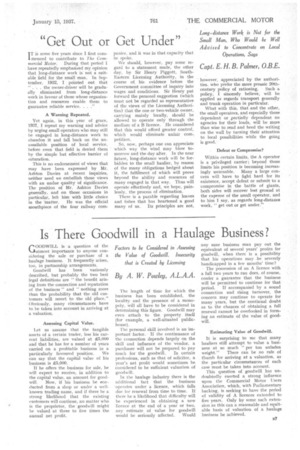"Get Out or Get Under"
Page 41

If you've noticed an error in this article please click here to report it so we can fix it.
Long-distance Work is Not for the Small Man, Who Would be Well Advised to Concentrate on Local Operations, Says Capt. E. H. B. Palmer, O.B.E. I T is sonic five years since I first com menced to contribute to The Commercial Motor. During that period I have repeatedly emphasized my opinion that long-distance work is not a suitable field for the small man. In September, 1932, I pointed out that " . . . the owner-driver will be gradually eliminated from long-distance work in favour of those whose organization and resources enable them to guarantee reliable service. . . ."
A Warning Repeated.
Yet again, in this year of grace, 1937, I repeat my warning and advice by urging small operators who may still be engaged in long-distance work to abandon it and fall back on the unassailable position of local service, before even that field is denied them by the simple but effective barrier of saturation.
This is no endorsement of views that may have been expressed by Mr. Ashton Davies at recent inquiries, neither need we embellish those views with an undue quality of significance. The position of Mr. Ashton Davies generally, and on those occasions in particular, left him with little choice in the matter. He was the official mouthpiece of the four railway com panies, and it was in that capacity that he spoke.
We should, however, pay some regard to a statement made, the other day, by Sir Henry Piggott, SouthEastern Licensing Authority, in the course of his evidence before the Government committee of inquiry into wages and conditions. Sir Henry put forward the personal suggestion (which must not be regarded as representative of the views of the Licensing Authorities) that the one or two-vehicle owner, carrying mainly locally, should be allowed to operate only through the medium of a B licence. He considered that this would afford greater control, which would eliminate unfair competition.
So, now, perhaps one can appreciate which way the wind may blow tomorrow and the day after. In the near future, long-distance work will be forbidden to the small haulier, by reason of the many obligations hedged about it, the fulfilment of which will prove beyond the ability and resources of many engaged in that way. Thus will operate effectively and, we hope, painlessly, the process of elimination.
There is a parable regarding loaves and fishes that has heartened a good many of us. Its principles are not, however, appreciated by the authorities. who prefer the more prosaic 20thcentury policy of rationing. Such a policy, I sincerely believe, will be applied as regards transport generally and trunk operation in particular.
What with this, that and the other, the small operators, and especially those dependent or partially dependent on agencies for their loads, will be more than wise to read and heed the writing on the wall by turning their attention to local possibilities while the going is good.•
Defeat or Compromise?
Within certain limits, the A operator is a privileged carrier ; beyond those limits his position is becoming increasingly untenable. Many a large concern will have to fight hard for its existence, accept defeat or submit to a compromise in the battle of giants, both sides will recover lost ground at the expense of the small operator, and to him I say, as regards long-distance work, "get out or get under."




















































































